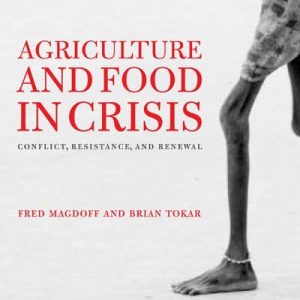Thought for food
Issue: 134
Posted: 27 March 12
Dave Sewell
Fred Magdoff and Brian Tokar (eds), Agriculture and Food in Crisis: Conflict, Resistance and Renewal (Monthly Review, 2010), £14.95
When prices for many basic foods spiked in 2007 and 2008, thousands rioted in more than 30 countries from Bangladesh to Burkina Faso. In Haiti the riots drove President Réné Préval from office; in Egypt they were a key act in the prologue to the current revolution.
It took the world’s intellectual establishment by surprise. By 2009 Scientific American was running articles with titles such as “Could Food Shortages Bring Down Civilization?” After all, there can be few more serious failures of any social order than an inability to feed the population—as the Bolsheviks knew when they made the demand for “peace, bread and land” one of their main slogans in the Russian Revolution of 1917. This collection of essays is a serious attempt to theorise the crisis in the global food economy for the left.
What emerges is a powerful narrative of the struggle over control of food production over the last three decades. Mainstream debate about the food crisis tends to fall into one of two camps: either complacently situating its causes outside of the global economy and hoping for a technological fix to usher in a new Green Revolution, or channelling 19th century doom-monger Thomas Malthus to scaremonger about population growth.
So this book provides invaluable ammunition to demonstrate the centrality of social and economic factors to the problem of feeding the world. The subjugation of agriculture to the forces of the market is creating scarcity even where there should be plenty, and undermining the possibilities for sustaining food production into the 21st century.
Chief among the villains of the piece are the trio of international financial institutions. The World Trade Organisation has forced many developing countries to drop tariffs and subsidies for food producers in order to facilitate global competition, meaning that, instead of food for domestic consumption, farmers are encouraged to focus on cash crops for export. Increasingly, this includes the biofuels demanded by the US and EU. And the International Monetary Fund and World Bank, with their structural adjustment programmes of privatisation and austerity, have removed the safety nets for small farmers, who then struggle to compete with global agribusiness….
Read the entire review in International Socialism

Comments are closed.